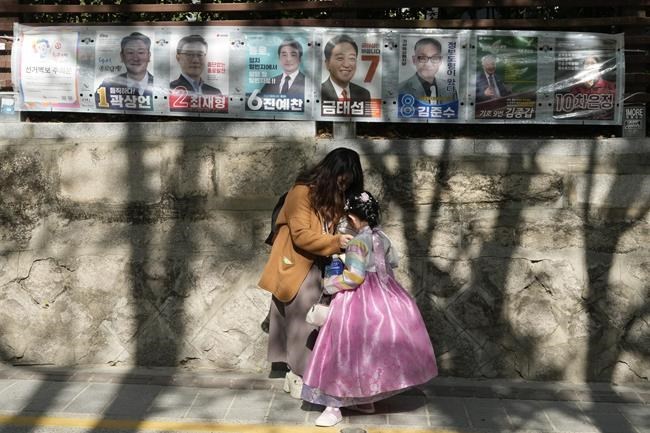SEOUL, South Korea (AP) — South Korea’s liberal opposition parties were expected to win a landslide victory in Wednesday’s parliamentary election, initial exit polls suggested, a result that if confirmed would make conservative President Yoon Suk Yeol a lame duck for his remaining three years in office.
The joint exit polls by South Korea’s three major TV stations – KBS, MBC and SBS – showed the main opposition Democratic Party and its satellite party were forecast to win combined 178-197 seats in the 300-member National Assembly. They expected anothernew liberal opposition party to win 12-14 seats.
The polls suggested the ruling People Power Party and its satellite party were projected to win 85-105 seats.
Wednesday's election was widely seen as a mid-term confidence vote on President Yoon, a former top prosecutor who took office in 2022 for a single five-year term. He has been grappling with low approval ratings and a liberal opposition-controlled parliament that has limited his major policy platforms.
Regardless of the results, Yoon will stay in power, but if his party fails to regain a parliamentary majority it could set back Yoon’s agenda and further intensify conservative-liberal fighting.
“What would matter to the People Power Party is whether it can become the biggest party or the second biggest party,” said Choi Jin, director of the Seoul-based Institute of Presidential Leadership. “If his party loses the election, Yoon will find it difficult to move forward even a single step on state affairs.”
Of the 300 seats, 254 will be elected through direct votes in local districts, and the other 46 to the parties according to their proportion of the vote. Election observers say candidates in about 50 to 55 local districts are in neck-and-neck races.
In the months ahead of the election, the conservatives supporting Yoon and their liberal rivals exchanged toxic rhetoric and mudslinging. The conservative-liberal division deepened during the 2022 presidential election, during which Yoon and his main rival Lee Jae-myung spent months demonizing each other. Yoon eventually beat Lee by the narrowest margin ever for a Korean presidential candidate.
Lee, now the chairman of the opposition Democratic Party, is a harsh critic of Yoon’s policies and is eying another presidential bid. He faces an array of corruption investigations that he argues are politically motivated and pushed by by Yoon’s government.
There was a brief soul-searching about South Korea’s divisive politics after Lee was stabbed in the neck in January by a man who, according to police, tried to kill Lee to prevent him from becoming president. But as the parliamentary election approached, the rival parties began churning out abusive rhetoric and crude insults against each other.
Ruling party leader Han Dong-hoon called Lee “a criminal” and labeled his past comments as “trash.” Lee’s party spokesperson described Han’s mouth as a “trash bin.” Han accused Lee of using a sexist remark against a female ruling party candidate.
During one of his final campaign events on Tuesday, Han argued that giving too many seats to Lee’s Democratic Party will throw South Korea into political turmoil. “Tomorrow’s 12 hours will determine whether the Republic of Korea will plunge into shocking chaos and despair or overcome a crisis,” Han said, using South Korea’s official name.
Speaking ahead of his corruption trial at a Seoul court, Lee urged voters to punish the Yoon government, which he said has used prosecutors to suppress opponents. “I earnestly ask you to hand out your judgement on a government that betrays and goes against the people,” Lee said.
Chung Jin-young, a former dean of the Graduate School of Pan-Pacific International Studies at Kyung Hee University, predicted that the opposition parties could win a combined 150-180 seats.
“That would cause a political deadlock for the Republic of Korea for the next three years, as both the ruling and opposition parties can’t pursue things unilaterally and won’t likely make terms with each other,” Chung said.
Earlier this year, Yoon saw rising approval ratings over his strong push to drastically increase the number of medical students despite vehement protests by incumbent doctors. Yoon has said he aims to create more doctors to brace for the country’s rapidly aging population, but thousands of young doctors have gone on strike, saying that schools can’t handle an abrupt increase in students.
The doctors’ walkouts eventually left Yoon facing growing calls to find a compromise, with patients and others experiencing delays of surgeries and other inconveniences. Yoon’s ruling party is also struggling with rising prices of agricultural products and other goods and criticism of Yoon’s personnel management style.
“President Yoon has said a priority would be given to stabilizing prices and livelihoods, but they weren’t stabilized, so I think that will be a big negative for the Yoon government during the election,” Kim Daye, a 32-year-old Seoul resident, said.
___
Associated Press writer Jiwon Song contributed to this report.
Hyung-jin Kim, The Associated Press




